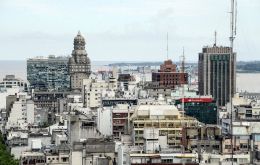MercoPress. South Atlantic News Agency
Economy
-
Thursday, September 29th 2022 - 09:20 UTC
Bank of England to the rescue of first stumble of PM Truss economic program

Britain's central bank on Wednesday warned that dwindling confidence in the economy poses a significant risk as it took the unusual step of intervening directly in financial markets. The move was aimed at restoring financial stability in markets shaken by the Liz Truss government fiscal policies.
-
Wednesday, September 28th 2022 - 10:00 UTC
UN mission in Haiti cut down to “only essential” staff

The United Nations mission in Haiti has been cut down to a minimum after all non-essential workers were instructed to evacuate the violence-torn Caribbean nation. The announcement came two months after the UN Security Council voted to extend the mission's presence for at least another year.
-
Tuesday, September 27th 2022 - 21:33 UTC
Several flights in Argentina grounded due to strike

Union protests kept the ARA Libertad from docking on time, union measures halted tire production, and labor measures led to either the cancelation or postponement of several flights Tuesday at Buenos Aires' two airports, as well as in other air terminals nationwide.
-
Tuesday, September 27th 2022 - 20:05 UTC
Spanish prosecutors want Shakira jailed for 8 years for tax evasion

Colombian singer Shakira is facing an eight-year prison sentence for tax evasion in addition to a hefty fine after charges were filed against her in Spain.
-
Tuesday, September 27th 2022 - 10:00 UTC
Argentina's economic activity grows 5.6% YoY in July

Argentina's National Institute of Statistics and Census (Indec) Monday released a report according to which the country's economic activity grew 5.6% interannually in July.
-
Tuesday, September 27th 2022 - 09:56 UTC
Argentine tires: no solution in sight

Argentine tire manufacturers Monday told the government that “the rights of the companies” were being violated as labor unions seized their plants and prevented work from continuing.
-
Tuesday, September 27th 2022 - 09:46 UTC
Mercosur partners concentrate most of Paraguay's foreign trade

Paraguay's foreign commerce of manufactured and agro-industrial goods reached US$ 3,383 million during the first eight months of 2022, with a clear predominance of Mercosur partners, points out the country's Ministry of Industry and Commerce.
-
Monday, September 26th 2022 - 09:08 UTC
Another equality 'advance' for Swiss women, they will retire as 65, just like Swiss men

Switzerland is known as a country of direct democracy since voting on referendums is practiced quite often, as happened on Sunday when voters accepted the government's pension reform albeit by a narrow margin.
-
Saturday, September 24th 2022 - 09:40 UTC
Uruguay forecasts promising cruise season for next Summer

Uruguayan authorities are forecasting a promising cruise season for next Summer, according to Tourism Undersecretary Remo Monzeglio, who confirmed there were so far 130 confirmed reservations for calls in Montevideo and 57 for Punta del Este.
-
Friday, September 23rd 2022 - 10:56 UTC
Uruguay ranked among best places for investing in the near future

According to one of the world's leading financial magazines, Uruguay remains “a haven of stability in a volatile region.” The report featured the opinions of experts participating in a regular survey, who were asked to evaluate 174 countries quarterly.
